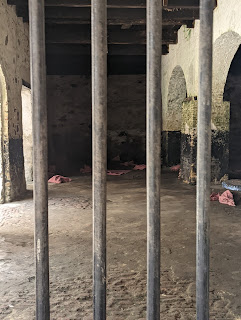
Over time, I began to recognize road safety challenges in Ghana. In Ghana, motorcycles are a major form of transportation and, often, people operate them unsafely. For example, many people do not wear helmets on motorcycles, potentially due to their inability to afford the cost of one. More unsafe behaviours I have witnessed include young children operating motorcycles and women on motorcycles with infants strapped to their back. Those who drive motor vehicles often speed, crowd in lanes, and fail to stop for pedestrians and oncoming traffic. Additionally, road design in Ghana leads to heavy traffic congestion in the city, further increasing the likelihood of motor vehicle accidents. As a result of these contributing factors, a health crisis emerges.
The prevalence of motor vehicle accidents weighs heavy on Ghana's healthcare system. My time spent working in Accident and Emergency gave me a full picture of the detrimental effects of motor vehicle accidents in Ghana. Every day, people are rushed into Accident and Emergency with road injuries, most commonly polytraumas, multiple fractures, and skin abrasions. Some Ghanains practice traditional medicine and attempt to treat fractures locally, which can lead to severe conditions such as infection and gangrene. In A&E, fractures are stabilized in various, innovative ways, such as by securing sand filled water bottles to each side of the affected limb. This example demonstrates how incredibly well the Ghanain nurses problem solve with their limited resources.

When examining the high incidence of motor vehicle accidents in Ghana, I often reflect on the root causes of the issue. As reported by the World Health Organization, in Ghana, road injury is the 7th leading cause of death in males and results in 39.8 deaths per 100,000. Moreover, 92% of deaths caused by road injury occur in low and middle income countries, demonstrating the disproportionate impact of the issue. Although Ghana has road regulations and drivers licensing requirements, there is a failure to enforce them. When considering Ghana's socioeconomic status, which was heavily weakened by colonization, I recognize the financial challenges in reducing road injuries. Many solutions to the crisis require major financial investments, such as hiring and properly paying law enforcement, investing in road infrastructure, and revising road policies. A multifaceted approach that allocates Ghana's existing resources to road safety is necessary to mitigate the epidemic of road injuries in Ghana and reduce the burden on Ghana’s healthcare system.
- Brianna, Year 4 BSN


















